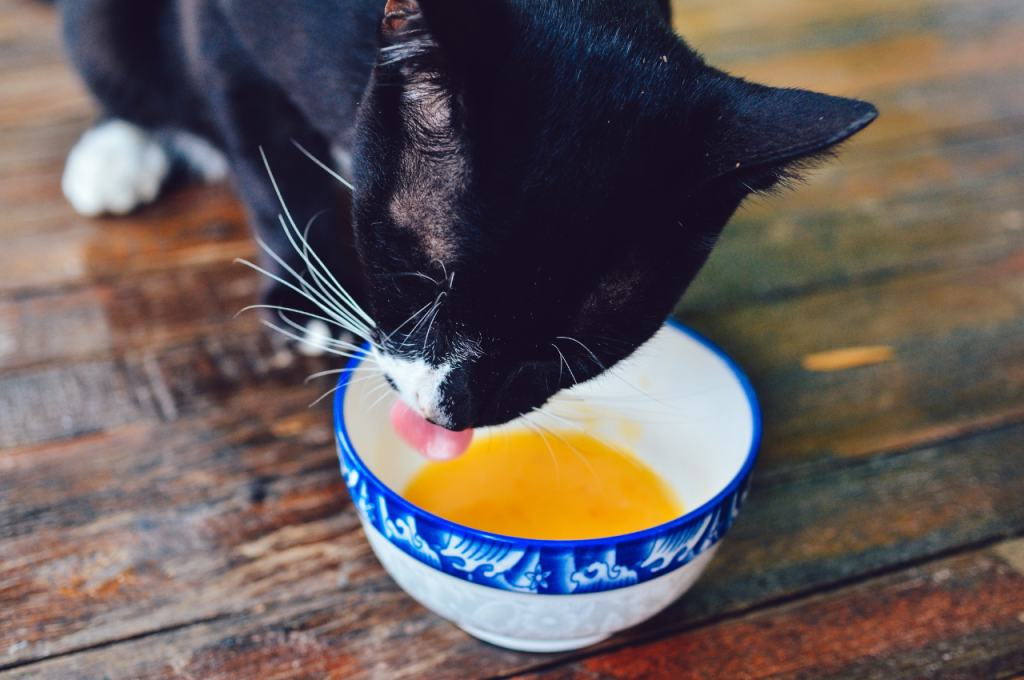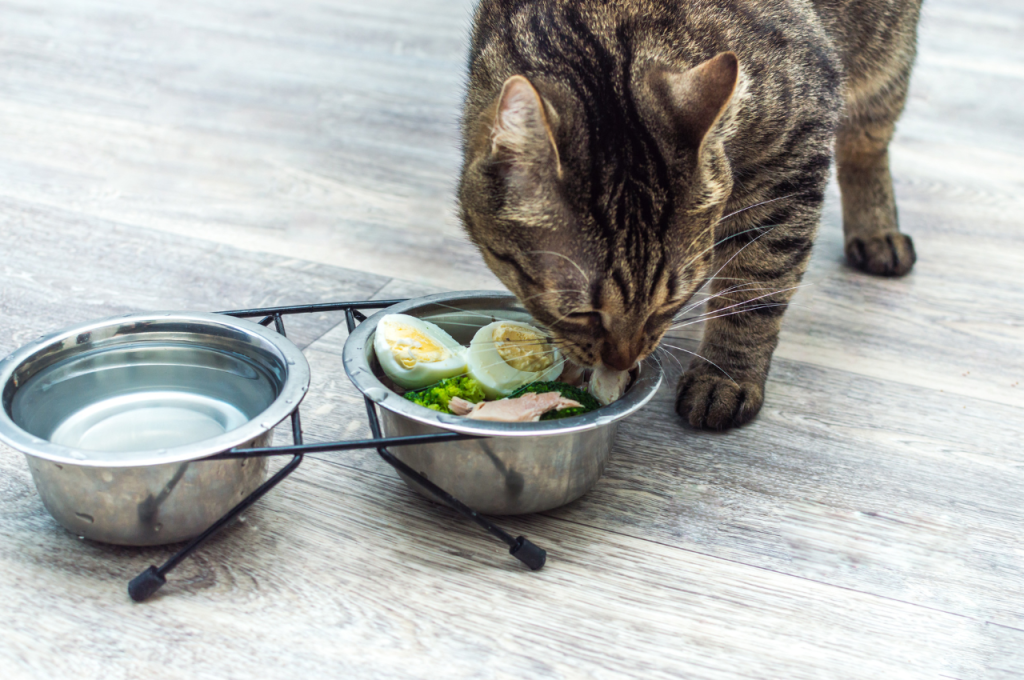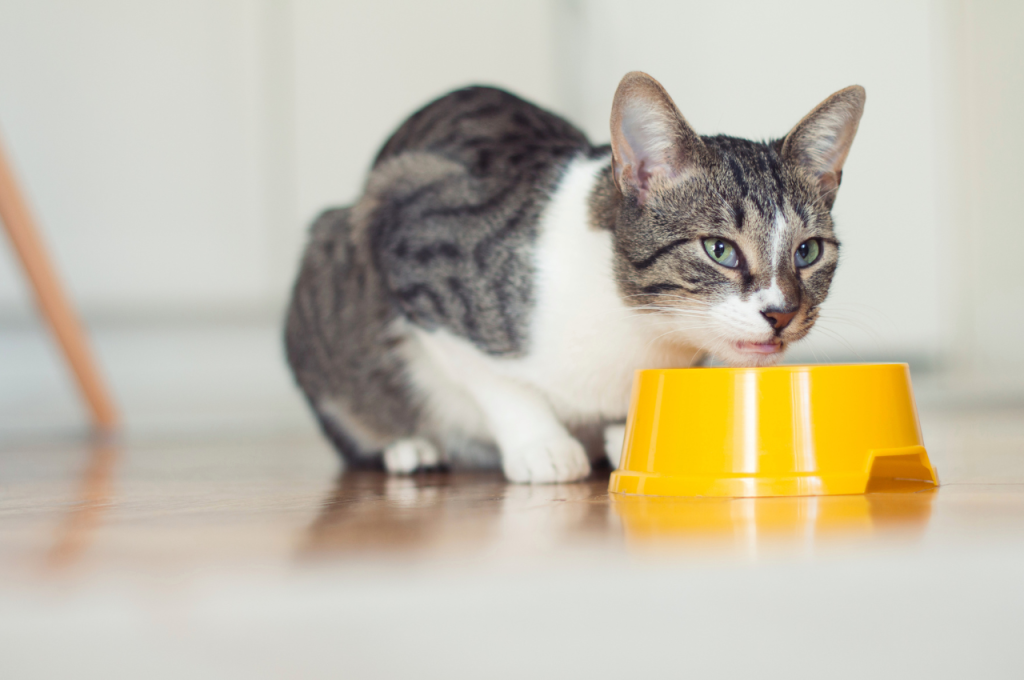Yes, cats can eat 1 egg a day as a healthy protein source. Eggs provide essential nutrients for cats.
Cats can enjoy the benefits of eggs, but moderation is key. Feeding your cat one egg per day can be a nutritious addition to their diet. Eggs are high in protein, vitamins, and minerals which can contribute to your cat’s overall health.
However, it is important to consult with your veterinarian before making any significant changes to your cat’s diet. Additionally, ensure that the egg is cooked thoroughly to avoid any potential risks of foodborne illnesses. By incorporating eggs into your cat’s diet in moderation, you can provide them with a delicious and nutritious treat.
Can Cats Eat Eggs?
Discovering if eggs are safe for cats to eat is a common concern for pet owners. Cats are obligate carnivores, meaning their diet primarily consists of meat, but can they eat eggs?

Nutritional Benefits
- Eggs are rich in protein, aiding in muscle growth and maintenance.
- They contain essential amino acids like taurine, crucial for feline health.
- Eggs offer vitamins and minerals, supporting overall well-being.
Risks and Concerns
- Raw eggs can pose a risk of salmonella, therefore cooked eggs are recommended.
- Excessive intake of eggs can lead to obesity due to their high-fat content.
- Some cats may develop allergies to eggs, causing digestive issues.
Nutritional Benefits of Eggs for Cats
Discover the nutritional benefits of feeding eggs to cats. With moderation, one egg a day can provide essential protein and nutrients for feline health. Incorporating eggs into your cat’s diet can promote a shiny coat and overall well-being.
Protein
Eggs are rich in high-quality protein, containing all the essential amino acids that cats need for optimal health. Protein is crucial for muscle growth, repair, and overall body function in cats.
Vitamins and Minerals
Eggs are packed with essential vitamins and minerals that contribute to a cat’s overall well-being. These include vitamin A, which supports vision and immune function, vitamin D for bone health, and vitamin E for antioxidant protection.
Healthy Fats
The healthy fats in eggs contribute to your cat’s overall well-being. When it comes to the nutritional benefits of eggs for cats, they offer a substantial source of protein. Additionally, eggs are rich in essential vitamins and minerals, providing your feline companion with a well-rounded diet. The healthy fats in eggs can also boost your cat’s overall health.
Are Eggs Safe for Cats?
As cat owners, we always want to ensure our furry friends are eating a well-balanced diet. While cats are obligate carnivores, meaning their bodies are designed to thrive on a meat-based diet, you may wonder if eggs can be included in their meals. Eggs are a great source of protein, vitamins, and minerals that can benefit cats. However, it’s important to understand the potential risks and precautions when it comes to feeding eggs to our feline companions.
Risk of Salmonella
Salmonella is a type of bacteria commonly associated with eggs, and it can pose a risk to both humans and animals. While cats are generally less susceptible to salmonella compared to humans, it is still essential to take precautions. Cooking eggs thoroughly can significantly reduce the risk of salmonella. When feeding eggs to your cat, make sure they are fully cooked, with no trace of raw or runny yolk, as this is where the bacteria is most likely to be present. By properly cooking the eggs, you can eliminate the risk of salmonella and keep your cat safe.
Allergic Reactions
Just like humans, cats can also develop allergies to certain foods, and eggs are no exception. Although rare, some cats may have an allergic reaction to eggs, resulting in symptoms such as itching, rashes, or gastrointestinal upset. If you notice any adverse reactions after feeding your cat eggs, it is best to consult with your veterinarian. They can help determine if your cat is allergic to eggs or if there may be another underlying cause for the symptoms.
Cooked vs Raw Eggs
While cooking eggs is crucial for reducing the risk of salmonella, it is also important to note that raw eggs can interfere with nutrient absorption in cats. Raw eggs contain a protein called avidin, which binds to biotin (a B vitamin) and prevents its absorption. Biotin is essential for healthy skin, coat, and overall well-being. Therefore, it is recommended to feed cats only cooked eggs, as this ensures they receive the maximum nutritional benefits without any potential drawbacks.
In summary, eggs can be a nutritious addition to your cat’s diet, providing protein and essential nutrients. However, it is crucial to cook eggs thoroughly, eliminating the risk of salmonella and ensuring nutrient absorption. If you notice any adverse reactions or allergies in your cat, it’s always best to seek veterinary advice. By following these guidelines, you can safely incorporate eggs into your cat’s meals, contributing to their overall health and happiness.
Dos and Don’ts of Feeding Your Cat Eggs
Feeding your cat eggs can be beneficial in moderation. Incorporating a small amount into your cat’s diet can provide essential nutrients, including protein and amino acids. However, providing your cat with one egg a day may lead to an imbalanced diet, so it’s best to consult your veterinarian before making any significant changes to your cat’s diet.

Amount and Frequency
Cats can safely consume 1 egg per week as a part of their diet. Limiting the frequency prevents overconsumption of specific nutrients present in eggs, such as biotin and choline.
Preparation and Cooking
When serving eggs to your cat, ensure they are completely cooked. Raw eggs may contain salmonella which can be harmful to your pet. Simple cooking methods such as boiling or scrambling are ideal to ensure your cat’s safety.
Mixing with other Foods
Introducing eggs into your cat’s diet should be done gradually. Start by mixing a small amount of egg into their regular food to monitor any adverse reactions. Over time, you can gradually increase the amount of egg if your cat enjoys it and shows no signs of intolerance.
Signs of Egg Allergy in Cats
Eggs are a great source of protein and essential nutrients for humans, but can cats eat eggs? While some cats can enjoy the occasional egg as part of a balanced diet, it’s important to be aware of the signs of egg allergy in cats.
Digestive Issues
Signs of egg allergy in cats may manifest as digestive issues such as vomiting, diarrhea, or constipation. If you notice any digestive discomfort in your cat after consuming eggs, it’s essential to consult your veterinarian for further evaluation.
Skin Problems
Egg allergies in cats might also lead to skin problems, including itching, rashes, or hives. If you observe any unusual skin problems in your cat after egg consumption, it’s crucial to seek professional veterinary care.
Respiratory Symptoms
In some cases, egg allergy in cats can trigger respiratory symptoms like sneezing, coughing, or difficulty breathing. If your cat exhibits any respiratory distress after consuming eggs, it’s imperative to seek prompt veterinary attention.
Alternatives to Eggs for Cats
While eggs can be a healthy addition to your cat’s diet, they may not be suitable for every feline. Whether your cat has an egg allergy or simply doesn’t enjoy eggs, there are alternative protein sources and vitamin-rich foods that can provide the necessary nutrients.
Protein Sources
Cats require a diet rich in protein to support their lean muscle mass and overall health. Fortunately, several protein sources can serve as alternatives to eggs:
- Fish: Fish such as salmon and tuna are excellent sources of protein and omega-3 fatty acids, which support a healthy coat and skin.
- Poultry: Cooked chicken or turkey can be a tasty and protein-packed alternative to eggs. Just ensure that the meat is boneless and free from seasoning.
- Beef: Lean cuts of beef can also provide a good source of protein for your cat. It’s important to cook the meat thoroughly and remove any excess fat.
Vitamin and Mineral-rich Foods
Besides protein, cats require a variety of vitamins and minerals to maintain their overall well-being. Here are some vitamin and mineral-rich foods that can be included in your cat’s diet:

- Liver: The liver is nutrient-dense and packed with vitamins A and B, as well as iron. However, it should be fed in moderation due to its high vitamin A content.
- Pumpkin: Rich in fiber and vitamins A and C, pumpkin can help regulate digestion and support your cat’s immune system.
- Spinach: This leafy green vegetable contains iron, calcium, and vitamins A and K. Be sure to cook it before serving to increase digestibility.
Remember, it’s essential to introduce any new foods gradually and in moderation to prevent digestive upset. Consulting with your veterinarian before making any dietary changes is always recommended.
Consulting Your Veterinarian
When considering if cats can eat one egg a day, it is crucial to consult your veterinarian. Consulting Your Veterinarian is essential to ensure the well-being of your feline friend.
Animal-specific Considerations
Each pet has unique dietary requirements. Cats may have differing digestive capabilities that need to be considered before introducing new foods.
Medical History
Understanding your cat’s medical history is vital. Any allergies or sensitivities should be taken into account when planning their diet.
Expert Advice
Seeking professional guidance from a veterinarian can provide insightful recommendations specifically tailored to your cat’s needs.
Frequently Asked Questions for Can Cats Eat 1 Egg A Day?
In this section, we will address common questions regarding whether can cats eat 1 egg a day.
Q. Can cats eat eggs every day?
Yes, cats can eat eggs in moderation. Eggs are a good source of protein and can be beneficial for a cat’s diet. However, it’s important to ensure the egg is fully cooked to avoid any risk of salmonella. Always consult with your vet for specific dietary recommendations for your cat.
Q. Are eggs good for a cat’s health?
Yes, eggs can be beneficial for a cat’s health when given in moderation. They are a good source of protein and essential nutrients. However, it’s important to ensure the eggs are cooked and provided as part of a balanced diet.
Consult your veterinarian before incorporating eggs into your cat’s diet.
Q. What are the potential risks of feeding eggs to cats?
Feeding raw eggs to cats can pose the risk of salmonella and other bacterial infections. It’s important to always cook the eggs thoroughly before giving them to your cat. Additionally, some cats may have allergies or sensitivities to eggs, so it’s best to introduce them in small amounts and monitor their reaction.
Q. How often can I give eggs to my cat?
It’s best to give eggs to your cat as an occasional treat rather than a daily occurrence. Moderation is key to ensuring a balanced diet for your cat. Consult with your veterinarian to determine the frequency and portion size that is appropriate for your cat’s individual dietary needs.
Conclusion
It is safe for cats to consume one egg a day as an occasional treat. Eggs provide a good amount of protein and other essential nutrients that can benefit their overall health. However, it is important to consider your cat’s individual dietary needs and any potential allergies or sensitivities they may have.
Consulting with a veterinarian is always recommended to ensure you are providing the best diet for your feline friend.
